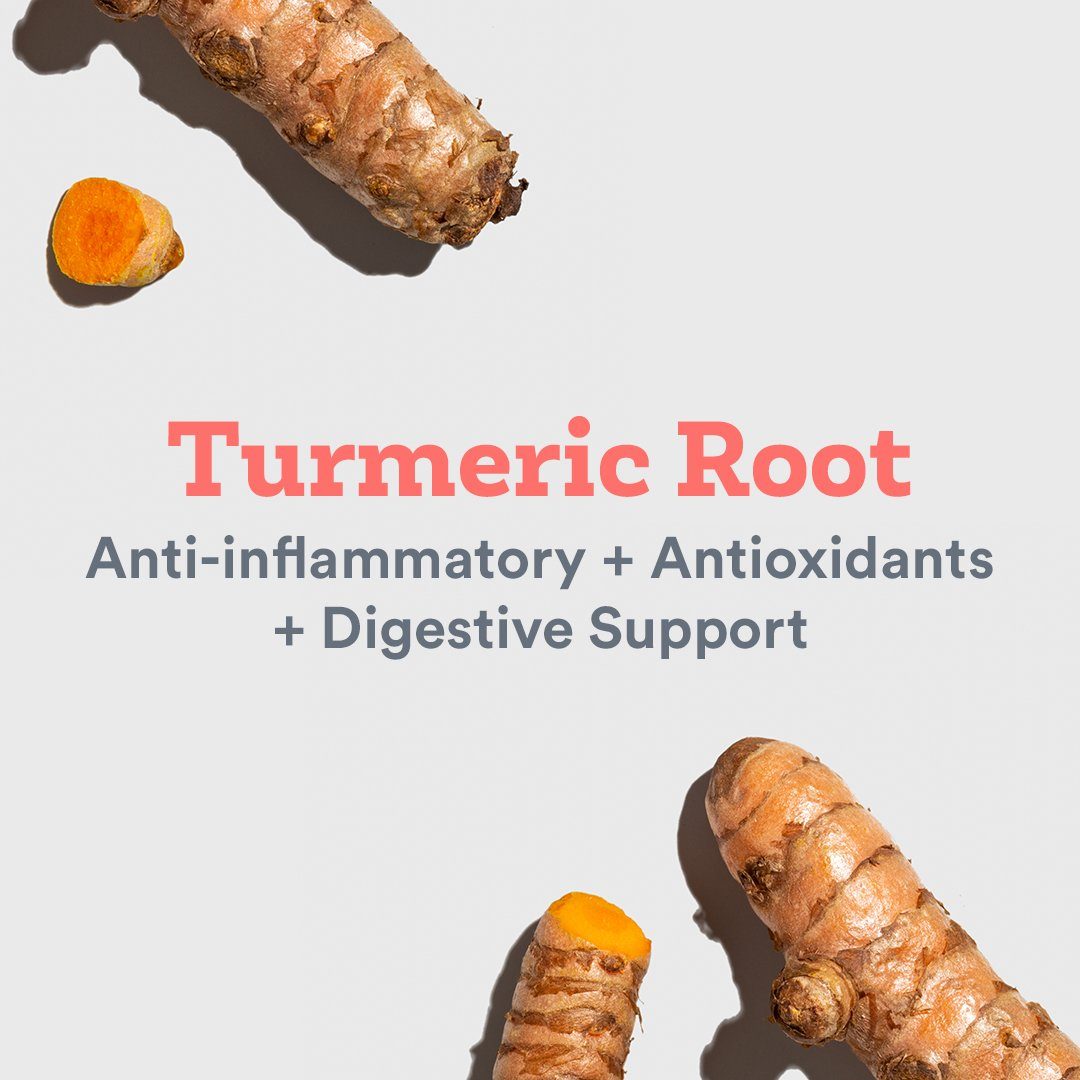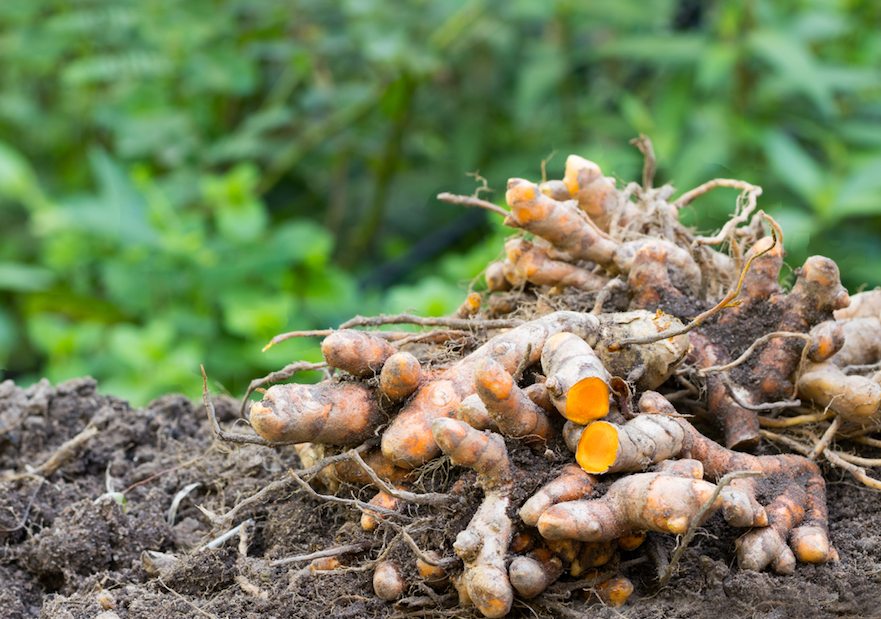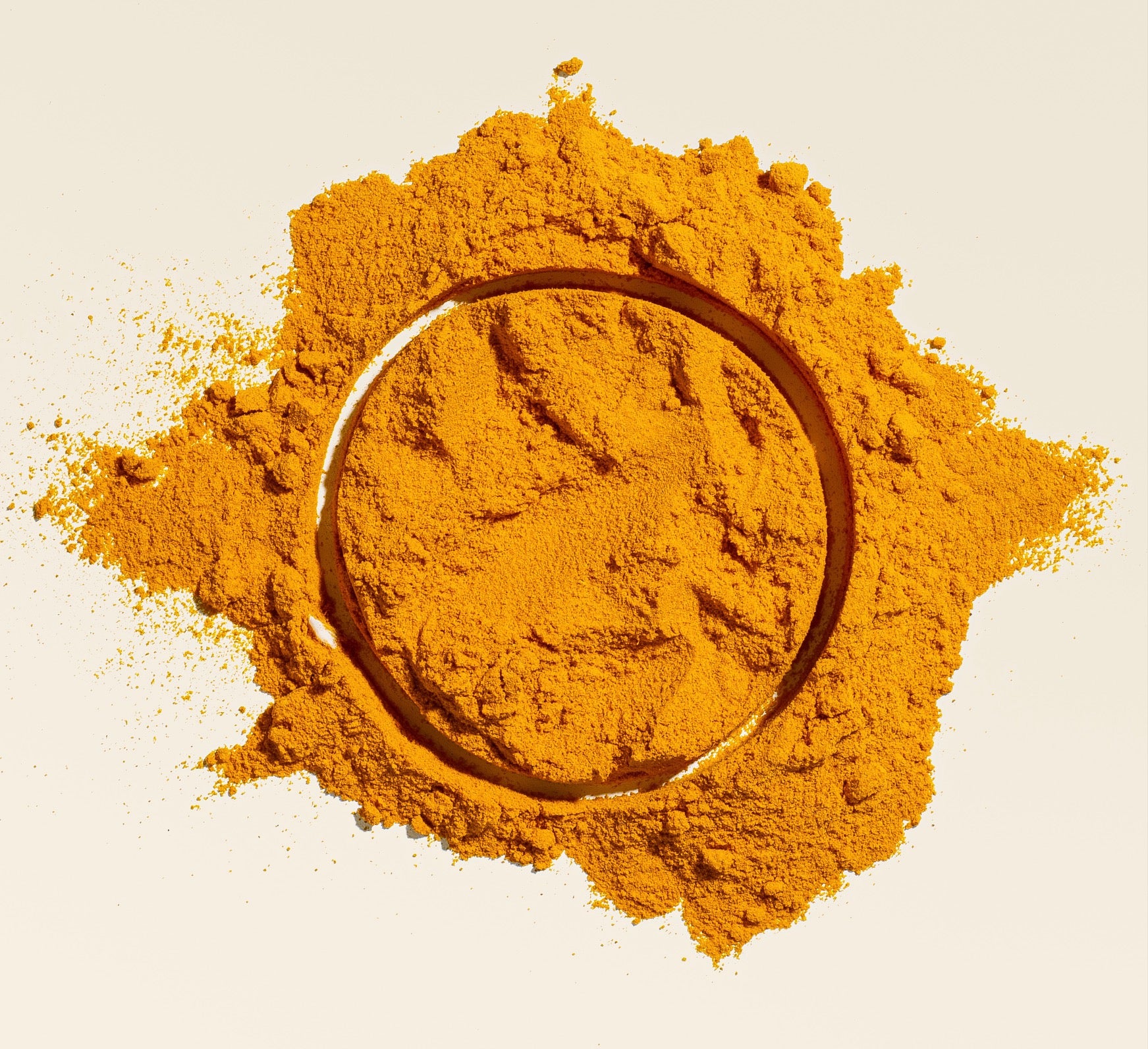
Scientific/Latin name: Curcuma Longa
Also known as: Curcumin, Curcuma, Curcuma aromatica
Native to: India, Southeast Asia and Indonesia
Parts used: Rhizome/Root
Top benefits: Anti-inflammatory, Antioxidant-Rich and Digestive Support

Turmeric, the Golden Root
Maybe you’re familiar with Turmeric as a seasoning. If you’re a fan of Indian cuisine, you’ll often find it in these dishes. But Turmeric has other benefits beyond its culinary prowess.
What Is Turmeric?
Trusted for years in traditional medicine and by dietitians and nutritionists alike, the science behind Turmeric proves it’s a root worth taking a second look at.
Turmeric root is the rhizome/root of Curcuma longa, a potent health-promoting herb that originates from India, Southeast Asia and Indonesia, and is now cultivated extensively in tropical and subtropical regions around the world. The popular spice that gives curry powder its yellow color, Turmeric is considered by many to be the most powerful disease-fighting herb on the planet.
History of Turmeric
Turmeric is one of the most extensively researched herbs in Ayurvedic medicine, and has been used for centuries in both traditional Indian and Chinese medicine for digestive health and treatment of liver ailments, inflammation and pain.
Extensive research and clinical trials have demonstrated the therapeutic properties of Turmeric and its potential against a wide range of diseases. Turmeric’s volatile oil and curcuminoids (which give Turmeric its bright yellow-orange color) are believed to be its primary active ingredients. Cell culture and animal studies suggest that curcumin has extensive activity as antioxidant, neuroprotective, anti-tumor, anti-inflammatory and anti-arthritic agent. Human clinical trials also suggest its potential therapeutic role in numerous chronic diseases such as cancer and inflammatory bowel diseases.
Health Benefits of Turmeric
The secret to better health and improved digestion could be this powerful little root. Turmeric has also gained popularity for its calming and soothing effects on joint pain and muscle aches.
Here, we’ll cover the benefits of turmeric so you can understand why it’s both popular and important.
Anti-inflammatory
One of curcumin’s most powerful activities is its ability to control inflammation. Turmeric is used in both Ayurveda and western herbal medicine as an anti-inflammatory to help relieve joint pain and other pain symptoms tied to inflammation in the body. Similarly, its main actions in TCM are to facilitate the movement of blood and Qi (vital energy or life force) to relieve pain.
Inflammatory conditions and arthritis are among the most common human diseases for which curcumin is being evaluated, and numerous clinical studies have demonstrated its potential. One study that compared a number of anti-inflammatory compounds, including aspirin and ibuprofen, found that curcumin was one of the most anti-inflammatory agents. In another study, dietary curcumin's action in reducing colon inflammation was demonstrated using an animal model of human inflammatory bowel disease.
In light of curcumin’s established anti-inflammatory and anti-arthritic properties, one study evaluated the effectiveness of curcumin alone, and in combination with an anti-inflammatory drug, in patients with rheumatoid arthritis. The curcumin-only group showed the highest reduction in disease activity, tenderness and swelling of joints, highlighting the need for future large-scale trials to confirm these findings in patients with arthritic conditions.
Clinical studies have also demonstrated the use of curcumin to help treat osteoarthritis. In one study, curcumin significantly improved pain and physical function scores in patients with knee osteoarthritis. Similarly, in a number of other osteoarthritis studies, curcumin significantly reduced knee pain and improved quality of life. These studies suggest that curcuminoids represent an effective alternative treatment for arthritic conditions.

Antioxidants
Antioxidants are molecules that protect our cells from free radicals. Free radicals are created in the body as a by-product of normal metabolic processes, as well as when we are exposed to external stressors like UV rays, pollution, and cigarette smoke. When free radicals are released in the body, cells can become damaged, a phenomenon known as oxidative stress. That damage can then be replicated in new cells.
Antioxidants work like little shields protecting cells from free radicals so that oxidative stress doesn’t occur, thereby helping to protect against various metabolic diseases, heart disease, brain disorders and age-related syndromes.
Taking a curcumin supplement can help protect your cells because of the antioxidant properties contained in curcuminoids, as demonstrated in many cell and animal model tests and even human trials.
Some researchers have suggested that curcumin’s anti-inflammatory activity may be in part due to its antioxidant activity, as free radicals have been implicated in the inflammation process.

Digestive support
Sometimes digestion feels impossibly slow. Other times, it goes too quickly or leaves us feeling uncomfortable. Bringing digestion back into balance is one reason many people turn to a Turmeric supplement.
Turmeric powder is used in herbal medicine to support digestion and help relieve gas and bloating, an action which is supported by clinical studies. It’s also used in herbal medicine to increase bile excretion by the liver and to stimulate contraction of the gallbladder. These are both key elements of healthy digestive function, as the gallbladder acts as a reservoir for bile produced by the liver, which it releases into the small intestine to digest fats. One study found that curcumin effectively reduced gallbladder volume, demonstrating that it induces gallbladder contractions.
In TCM, Turmeric's ‘tastes’ are bitter and pungent, determinant of its action in the body. Bitter ingredients like Turmeric are thought to have a cleansing action on the body by promoting elimination via urination or bowel movements. Turmeric is also thought to target the spleen, which assists with digestion, and the liver, which regulates the movement of bodily fluids.
As a bitter herb, Turmeric’s actions on digestion are similar to ‘digestive bitters’ in general: herbs that support digestive function by stimulating bitter receptors throughout the digestive tract, and in turn, promoting digestive juices such as stomach acid, bile and digestive enzymes to help break down food and facilitate the absorption of nutrients.
How Much Turmeric Is Bioavailable?
Turmeric extract increases in bioavailability when taken along with black pepper. A compound inside black pepper, piperine, works as a complementary compound to help our bodies better absorb the curcumin inside our dietary supplements.
That’s why you’ll find black peppercorn listed in the ingredients of JOYÀ products that contain Turmeric. Speaking of which, have you tried our functional superfoods yet? Now’s the time to try them out and enjoy the benefits of Turmeric.
Turmeric-an Treasure
In the far east, Turmeric has been a prized supplement used to treat numerous different health conditions for decades. In North America, we’re catching on, and we’re loving the flavor and the benefits of taking Turmeric.
Known for its ability to help soothe joint pain and muscle aches, it’s a favorite alternative to other pain relievers that might cause unwanted side effects. It’s also a member of the Ginger family and is helpful in alleviating occasional gastrointestinal upset. Lastly, it supports and protects your cells against oxidative stress, so you can truly thrive.
Make sure the Turmeric that you choose is from a trusted, transparent source.
The health research presented in this article is for informational use only. It is not a replacement for professional health advice and should not be construed as a recommendation of specific products. The products sold on this website are not intended to diagnose, treat, cure, or prevent any disease. This information does not provide dosage or format recommendations or possible drug interactions, and accordingly, should be used with the advice of a qualified health care practitioner.
